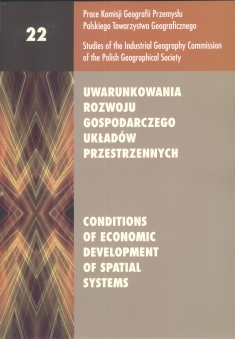Correlation Between the Level of Socio-economic Development and the Use of the Information and Communication Technologies
DOI:
https://doi.org/10.24917/20801653.22.6Słowa kluczowe:
information and communication technologies (ICT), level of informatization, global competitiveness, socio-economic developmentAbstrakt
During recent decades, the rate of structural shifts in the world economy has been especially fast. One of the factors used to influence these processes was to actively develop hi-tech industries and information and communication technologies. With the course of time, the level of informatization of society becomes a defining factor for a country’s competitiveness and predefines its ability to integrate into the global economy. The article characterizes the readiness of different countries to make a move to an innovative way of development based on analysis of combined rating tables that contain integral indices of society’s informatization level. The level of accomplishment of the task to form an innovative type of economy can be assessed in the link between implementation of science and technology progress achievements (i.e.: through the use of information and communication technologies) and the level of socio-economic development of the world countries. Current positions held by Russia and Poland according to some integral indices are also being analyzed.
Downloads
Bibliografia
Bukreev, I.N. (2009). Russia moves into the information society. Information Society: [electronic version], 3. Retrieved from: http://emag.iis.ru/arc/infosoc/emag.nsf/BPA/ d2519f9007348f- 19c32576770050c877
INSEAD and WIPO. (2012). The Global Innovation Index 2012: Stronger Innovation Linkages for Global Growth. Fontainebleau, France and Geneva, Switzerland: Authors. Retrieved from: http:// www.wipo.int/
International Telecommunication Union. (2012). Measuring the Information Society 2012. Geneva, Switzerland: Author. Retrieved from: http://www.itu.int/
Nagirnaya, A. (2012). Global patterns in expansion of ICT (the 20th – the beginning of the 21st century).
Abstract of the thesis for the degree of Candidate of Geographical Sciences. Moscow. Printed as manuscript.
National Science Board. (2012). Science and Engineering Indicators 2012. Arlington, VA: National Science Foundation. Retrieved from: http://www.nsf.gov/
Rodionova, I.A., Gordeeva, А.S. (2011). The role of information technologies at the economic development of countries. Issues of innovation economics, 7(7), 18–26. Retrieved from: http://www.creativeconomy.ru/en/articles/14564/
Rodionova, I. (2012). World manufacturing industry: structural and spatial shifts. Annals of the University of Bucharest – Geography Series, 55–67. Retrieved from: http://www.annalsreview.geo.unibuc.ro/2012/Rodionova.pdf
The World Bank Group. (2012). KEI and KI Indexes. Knowledge Assessment Methodology 2012. Retrieved from: http://www.worldbank.org/kam/
UNIDO. (2011). Industrial Development Report 2011. Vienna, Austria: Author. Retrieved from: http:// www.unido.org/
World Economic Forum. (2011). The Global Competitiveness Report 2011–2012. Geneva, Switzerland: Author. Retrieved from: http://www.weforum.org/
World Economic Forum. (2011). The Russia Competitiveness Report 2011. Geneva, Switzerland: Author. Retrieved from: http://www.weforum.org/
World Economic Forum. (2012). The Global Information Technology Report 2012. Geneva, Switzerland: Author. Retrieved from: http://www.weforum.org/
World Trade Organization. (2012). International trade statistics 2012. Geneva, Switzerland: Author. Retrieved from: http://www.wto.org/
Pobrania
Opublikowane
Jak cytować
Numer
Dział
Licencja
Artykuły publikowane są zgodnie z warunkami licencji Creative Commons (CC BY-ND 4.0; uznanie autorstwa-bez utworów zależnych).

